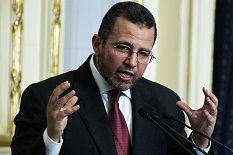CAIRO: Parliamentarians had to push their way through protesters early Monday, as hundreds gathered to press for demands, with more pouring to the streets surrounding the parliament building throughout the day.
In front of the heavily guarded parliament premises, the site of a deadly crackdown on a sit-in a month earlier, demonstrators chanted for bread, freedom and social justice. The same chants had dominated the Jan. 25 uprising a year earlier.
Different groups took to the streets, each with a different set of demands.
About 400-500 supporters of the Islamist parties dominating 70 percent of the seats greeted their MPs, chanting in their support.
Hundreds of family members of the revolution martyrs and representatives of 52 coalitions and political movements organized a march from Abdel Moneim Riad Square to parliament headquarters.
Protesters of the "retribution" march roamed the streets around Tahrir Square, the iconic epicenter of the revolution, to join three other marches demanding social justice, an end to military trials and freedom of artistic expression.
Protesters chanted "we either get their rights or die like them," reminding the elected Members of Parliament of martyrs’ rights.
"We helped them reach their positions in the parliament by electing them. Therefore, they should reclaim our children’s rights," Mona Tawfik, mother of Mohamed Morsi who was killed in front of Al-Marg police station on Jan. 28, said.
Shaker Abdel Fattah, father of Mostafa who was killed on Jan. 28, the Friday of Anger, said that he joined the protest to urge the parliament to dedicate its first session to discussing mechanisms to retrieve martyr’s rights.
The march demanded that Field Marshal Hussien Tantawy, head of the military council, step down and hand over power to parliament and for the swift trials of those who killed protesters.
"Mubarak’s trial is a charade. The police officers who killed our sons are still in the streets and they are still saying that Mubarak is president," Sanaa, mother of Moaaz El-Said who was murdered on Jan. 28, told Daily News Egypt.
According to Hisham Al-Kashef, a protester, the march reached parliament voice to MPs the revolution is ongoing until demands are met.
Throughout the day artists marched from the Cairo Opera House as did workers, labor leaders and doctors from the Egyptian Federation of Independent Trade Unions (EFITU) in Qasr El-Eini Street.
All groups called for social equality and freedom of expression. Many chanted against ministry rule and called on SCAF to hand power to civilian government.
Demands also included setting minimum and maximum wages, re-nationalizing privatized companies, monitoring the interior ministry’s actions as well as health and education reform
“We are here to ask for social justice. We as doctors need parliament to reconsider the Ministry of Health budget, and to monitor and help end corruption. This parliament only has two choices: to stand with us revolutionaries or conduct under the table deals. But even if they choose the latter, we are monitoring them,” said Dr. Mohamed Mahmoud.
Arguments broke out between protesters and supporters of the Muslim Brotherhood’s Freedom and Justice Party (FJP), which won a majority of seats.
“The FJP called on us to go to parliament to greet our new members and also … in case of tension, because we read on Facebook that there are calls for massive protests. We will also be present during the Jan. 25 [protests] to prevent any tensions,” said Dr. Ahmed Ibrahim, FJP member.
Hundreds of Egyptian artists made clear their rejection of any attempts to curb freedom of expression.
“We feel that the identity is endangered in an Islamist-majority parliament. … We aim to pressure Islamists [now] and not wait before it’s too late. Under Islamist rule, you cannot predict what kind of laws will be passed,” said actress Moataza Abdel Sabour.
